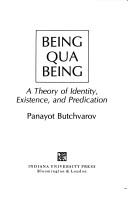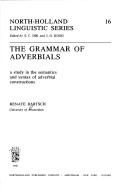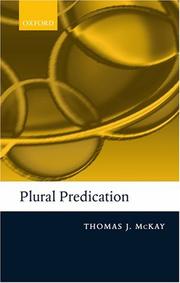| Listing 1 - 7 of 7 |
Sort by
|

ISBN: 0585215200 9780585215204 0253137004 9780253137005 Year: 1979 Publisher: Bloomington Indiana university press
Abstract | Keywords | Export | Availability | Bookmark
 Loading...
Loading...Choose an application
- Reference Manager
- EndNote
- RefWorks (Direct export to RefWorks)
Identity (Philosophical concept) --- Reality. --- Metaphysics. --- Predicate (Logic) --- Reality --- Metaphysics --- Philosophy --- Philosophy & Religion --- Speculative Philosophy --- God --- Ontology --- Philosophy of mind --- Truth --- Nominalism --- Pluralism --- Pragmatism --- Predicables (Logic) --- Predication (Logic) --- Categories (Philosophy) --- Language and logic --- Logic --- Identity --- Comparison (Philosophy) --- Resemblance (Philosophy)

ISBN: 0444109641 0720462061 9780444109644 Year: 1976 Volume: 16 Publisher: Amsterdam North-Holland
Abstract | Keywords | Export | Availability | Bookmark
 Loading...
Loading...Choose an application
- Reference Manager
- EndNote
- RefWorks (Direct export to RefWorks)
Lexicology. Semantics --- Grammar --- Grammar, Comparative and general --- Mathematical linguistics --- Generative grammar --- Predicate (Logic) --- Adverbiaux --- Linguistique mathématique --- Grammaire générative --- Prédicat (logique) --- Adverbials --- Adverb --- Grammar, comparative and general --- -Mathematical linguistics --- 801.56 --- Predicables (Logic) --- Predication (Logic) --- Categories (Philosophy) --- Language and logic --- Logic --- Algebraic linguistics --- Language and languages --- Linguistics --- Linguistics, Mathematical --- Applied linguistics --- Information theory --- Computational linguistics --- Comparative grammar --- Grammar, Philosophical --- Grammar, Universal --- Philosophical grammar --- Philology --- Grammar, Generative --- Grammar, Transformational --- Grammar, Transformational generative --- Transformational generative grammar --- Transformational grammar --- Psycholinguistics --- Syntaxis. Semantiek --- Statistical methods --- Mathematical models --- Grammar, Comparative --- Derivation --- Generative grammar. --- Mathematical linguistics. --- Adverb. --- 801.56 Syntaxis. Semantiek --- Predicate (Logic). --- Linguistique mathématique --- Grammaire générative --- Prédicat (logique) --- Connectives --- Grammar, Comparative and general - Adverb

ISBN: 0199278148 9780199278145 019170797X 9786610905904 0191535206 1280905905 1435623460 Year: 2006 Publisher: Oxford Clarendon
Abstract | Keywords | Export | Availability | Bookmark
 Loading...
Loading...Choose an application
- Reference Manager
- EndNote
- RefWorks (Direct export to RefWorks)
Plural predication is a pervasive part of ordinary language. We can say that some people are fifty in number, are surrounding a building, come from many countries, and are classmates. These predicates can be true of some people without being true of any one of them; they are non-distributive predications. However, the apparatus of modern logic does not allow a place for them. Thomas McKay here explores the enrichment of logic with non-distributive plural predication and quantification. His book will be of great interest to philosophers of language, linguists, metaphysicians, and logicians.
Logic --- Lexicology. Semantics --- Grammar --- Philosophy of language --- Grammar, Comparative and general --- Language and languages --- Logic. --- Predicate (Logic) --- Semantics (Philosophy) --- Number. --- Philosophy. --- Predicate (Logic). --- Semantics (Philosophy). --- Intension (Philosophy) --- Logical semantics --- Semantics (Logic) --- Semeiotics --- Significs --- Syntactics --- Unified science --- Logic, Symbolic and mathematical --- Logical positivism --- Meaning (Psychology) --- Philosophy, Modern --- Semiotics --- Signs and symbols --- Symbolism --- Analysis (Philosophy) --- Definition (Philosophy) --- Predicables (Logic) --- Predication (Logic) --- Categories (Philosophy) --- Language and logic --- Argumentation --- Deduction (Logic) --- Deductive logic --- Dialectic (Logic) --- Logic, Deductive --- Intellect --- Philosophy --- Psychology --- Science --- Reasoning --- Thought and thinking --- Dual (Grammar) --- Number (Grammar) --- Plural (Grammar) --- Number --- Methodology --- Linguistics --- Philology
Book
ISBN: 144714001X 1447140028 9786613703453 1280793066 Year: 2012 Publisher: London : Springer,
Abstract | Keywords | Export | Availability | Bookmark
 Loading...
Loading...Choose an application
- Reference Manager
- EndNote
- RefWorks (Direct export to RefWorks)
Description Logics (DLs) is a family of formalisms used to represent knowledge of a domain. They are equipped with a formal logic-based semantics. Knowledge representation systems based on description logics provide various inference capabilities that deduce implicit knowledge from the explicitly represented knowledge. A Proof Theory for Description Logics introduces Sequent Calculi and Natural Deduction for some DLs (ALC, ALCQ). Cut-elimination and Normalization are proved for the calculi. The author argues that such systems can improve the extraction of computational content from DLs proofs for explanation purposes.
Description logics. --- Proof theory -- Data processing. --- Description logics --- Proof theory --- Mathematics --- Physical Sciences & Mathematics --- Mathematical Theory --- Data processing --- Knowledge representation (Information theory) --- Predicate (Logic) --- Predicables (Logic) --- Predication (Logic) --- Representation of knowledge (Information theory) --- Logics, Description --- Computer science. --- Mathematical logic. --- Computer science --- Computer Science. --- Mathematical Logic and Formal Languages. --- Mathematics of Computing. --- Mathematics. --- Categories (Philosophy) --- Language and logic --- Logic --- Artificial intelligence --- Information theory --- Informatics --- Science --- Computer science—Mathematics. --- Algebra of logic --- Logic, Universal --- Mathematical logic --- Symbolic and mathematical logic --- Symbolic logic --- Algebra, Abstract --- Metamathematics --- Set theory --- Syllogism
Book
ISBN: 8847018838 8847018846 Year: 2011 Publisher: Milano : Springer Milan : Imprint: Springer,
Abstract | Keywords | Export | Availability | Bookmark
 Loading...
Loading...Choose an application
- Reference Manager
- EndNote
- RefWorks (Direct export to RefWorks)
Senza richiedere prerequisiti il testo si propone di fornire una dimostrazione dei fondamentali teoremi della logica matematica (compattezza, completezza di Gödel, Löwenheim-Skolem) introducendo i concetti sintattici e semantici in modo progressivo, dalla logica booleana a quella predicativa. Per facilitare la lettura attiva, il testo contiene numerosi esercizi.
Algebra, Boolean. --- Logic, Symbolic and mathematical. --- Logic. --- Mathematics -- Philosophy. --- Mathematics. --- Predicate (Logic). --- Mathematics --- Physical Sciences & Mathematics --- Mathematical Theory --- Predicate (Logic) --- Boolean algebra --- Boole's algebra --- Predicables (Logic) --- Predication (Logic) --- Argumentation --- Deduction (Logic) --- Deductive logic --- Dialectic (Logic) --- Logic, Deductive --- Mathematical logic. --- Semantics. --- Mathematical Logic and Foundations. --- Mathematical Logic and Formal Languages. --- Algebraic logic --- Set theory --- Categories (Philosophy) --- Language and logic --- Logic --- Intellect --- Philosophy --- Psychology --- Science --- Reasoning --- Thought and thinking --- Methodology --- Computer science. --- Formal semantics --- Semasiology --- Semiology (Semantics) --- Comparative linguistics --- Information theory --- Language and languages --- Lexicology --- Meaning (Psychology) --- Informatics --- Algebra of logic --- Logic, Universal --- Mathematical logic --- Symbolic and mathematical logic --- Symbolic logic --- Algebra, Abstract --- Metamathematics --- Syllogism
Book
ISBN: 0416822002 0416821901 9780416821901 Year: 1974 Publisher: London Methuen
Abstract | Keywords | Export | Availability | Bookmark
 Loading...
Loading...Choose an application
- Reference Manager
- EndNote
- RefWorks (Direct export to RefWorks)
800 --- #SBIB:309H514 --- #SBIB:16G --- 800 Taalwetenschap. Taalkunde. Linguistiek --- Taalwetenschap. Taalkunde. Linguistiek --- Linguistiek --- Logica en wetenschapsleer --- Subject (Philosophy) --- Sujet (Philosophie) --- Sujet et prédicat --- Topic and comment --- -Predicate (Logic) --- Predicables (Logic) --- Predication (Logic) --- Subject (Philosophy). --- Prédicat (logique) --- Sujet et prédicat --- Grammar, Comparative and general --- Comparative grammar --- Grammar --- Grammar, Philosophical --- Grammar, Universal --- Language and languages --- Philosophical grammar --- Grammar, Comparative --- Predicate (Logic) --- Philosophy --- Categories (Philosophy) --- Language and logic --- Logic --- Functional sentence perspective (Grammar) --- Predicate and subject (Grammar) --- Subject and predicate (Grammar) --- Theme and rheme --- Topic and comment (Grammar) --- Focus (Linguistics) --- Subject and predicate --- Syntax --- Philosophy of language --- Mathematical logic --- Predicate (Logic). --- Topic and comment. --- Language and logic. --- Linguistics --- Philology
Book
ISBN: 9780674724549 0674724542 0674726359 0674727541 9780674726352 9780674727540 Year: 2013 Publisher: Cambridge, MA
Abstract | Keywords | Export | Availability | Bookmark
 Loading...
Loading...Choose an application
- Reference Manager
- EndNote
- RefWorks (Direct export to RefWorks)
Aristotle was the founder not only of logic but also of modal logic. In the Prior Analytics he developed a complex system of modal syllogistic which, while influential, has been disputed since antiquity--and is today widely regarded as incoherent. Combining analytic rigor with keen sensitivity to historical context, Marko Malink makes clear that the modal syllogistic forms a consistent, integrated system of logic, one that is closely related to other areas of Aristotle's philosophy. Aristotle's modal syllogistic differs significantly from modern modal logic. Malink considers the key to understanding the Aristotelian version to be the notion of predication discussed in the Topics--specifically, its theory of predicables (definition, genus, differentia, proprium, and accident) and the ten categories (substance, quantity, quality, and so on). The predicables introduce a distinction between essential and nonessential predication. In contrast, the categories distinguish between substantial and nonsubstantial predication. Malink builds on these insights in developing a semantics for Aristotle's modal propositions, one that verifies the ancient philosopher's claims of the validity and invalidity of modal inferences. While it acknowledges some limitations of this reconstruction, Aristotle's Modal Syllogistic brims with bold ideas, richly supported by close readings of the Greek texts.
Logic, Ancient. --- Modality (Logic) --- Syllogism. --- Predicate (Logic) --- Logique ancienne --- Modalité (Logique) --- Syllogisme --- Prédicat (logique) --- Aristotle. --- Aristotle. -- Prior analytics. --- Predicables (Logic) --- Predication (Logic) --- Ancient logic --- Categories (Philosophy) --- Language and logic --- Logic --- Argumentation --- Reasoning --- Logic, Symbolic and mathematical --- Modal logic --- Nonclassical mathematical logic --- Bisimulation --- Aristoteles --- Aristote --- Aristotle --- Aristotile --- Logic, Ancient --- Syllogism --- Aristoteles. --- Arisṭāṭṭil --- Aristo, --- Aristotel --- Aristotele --- Aristóteles, --- Aristòtil --- Arisṭū --- Arisṭūṭālīs --- Arisutoteresu --- Arystoteles --- Ya-li-shih-to-te --- Ya-li-ssu-to-te --- Yalishiduode --- Yalisiduode --- Ἀριστοτέλης --- Αριστοτέλης --- Аристотел --- ארסטו --- אריםטו --- אריסטו --- אריסטוטלס --- אריסטוטלוס --- אריסטוטליס --- أرسطاطاليس --- أرسططاليس --- أرسطو --- أرسطوطالس --- أرسطوطاليس --- ابن رشد --- اريسطو --- Pseudo Aristotele --- Pseudo-Aristotle --- アリストテレス
| Listing 1 - 7 of 7 |
Sort by
|

 Search
Search Feedback
Feedback About UniCat
About UniCat  Help
Help News
News